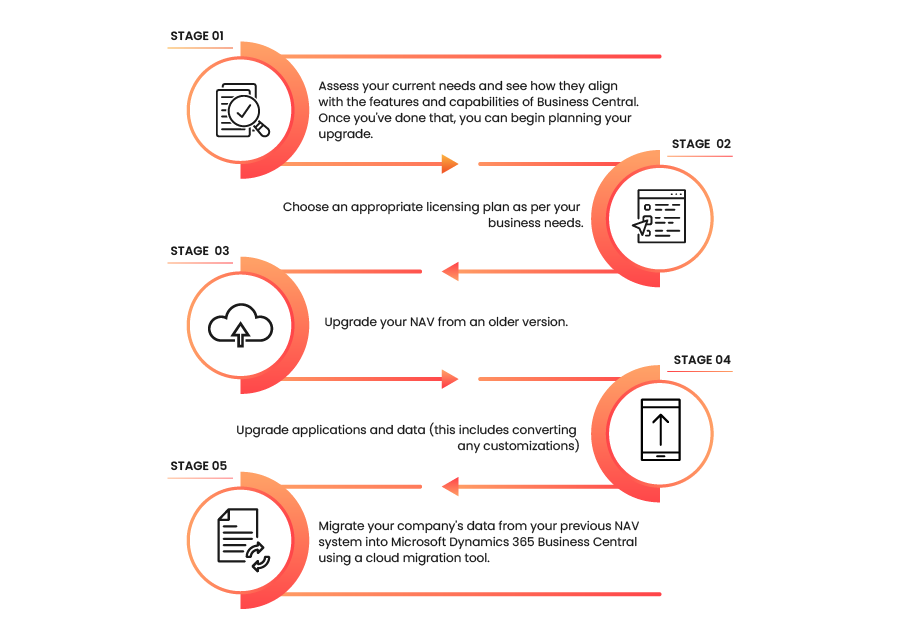Introduction
With the ever-changing business landscape, it’s become clear that both business processes and underlying support systems need to evolve to meet the demands of modern enterprises. Most businesses are adopting the latest technology to improve competitiveness, customer engagement, and drive growth.
Are you ready with your digital transformation strategy?
Are you a Dynamics NAV user? If yes, upgrading your ERP to Business Central is a good way to start your transformation journey. Dynamics 365 Business Central’s features and functionality can give you the competitive edge you need to drive growth.
Why Upgrade to Business Central?
Upgrading to Business Central can help your business in several ways. It is a powerful, all-in-one business management solution that allows small and medium enterprises to automate and streamline their operations. Business Central provides a foundation for growth and scalability, so you can continue to scale your business as it grows. With so many benefits, upgrading to Business Central is a great way to invest in the future of your business.
- Business Central can help improve your financial visibility and control.
- You’ll be able to manage your inventory and supply chain better.
- You can streamline your customer management with Business Central’s CRM features.
For more reasons, read our blog – 6 Reasons to Upgrade from Dynamic NAV to Business Central
Dynamics NAV to Business Central Upgrade Options
There can be many ways to upgrade from Microsoft Dynamics NAV to Dynamics 365 Business Central. A clear understanding of your business processes, current Dynamics NAV system, customizations, data, and your business needs will help you take the right decision.
Options to upgrade from NAV to Business Central:
1. Take Everything with You – The first option is to ask your ERP partner to upgrade your NAV system and carry your existing data and customizations. This way, you don’t have to start from scratch. However, it may cost more and take longer to upgrade.
For instance, in case there is some ISV solution or custom solutions from an authorized partner will go as it is from NAV to BC. This means for the partner who is upgrading doesn’t have any option for any kind of optimization, etc. Upgraded APP for ISV solution from ISV partner will be installed in BC.
In another case where clients don’t have any idea about all the features that were developed earlier and what the usability is, in such a situation all will go as it is. Without giving any scope of optimizations, changes, etc. This leads to risks because when we migrate everything as-is all redundant features, customization or data will also get migrated in Business Central which leads to garbage-in garbage-out (GIGO).
2. Start Fresh – The second option is to ask your ERP partner to start fresh with only the essential data.Only required features, customizations will be taken and options to optimize the customization and removal of redundant features, data, etc. This option can be less expensive and quicker, but it will require more work on your end to set everything up again. Ultimately, deciding which way to upgrade depends on your specific needs and budget.
For any successful upgradation, we normally first do diagnostic study where we discuss with client’s process owners – existing usability, challenges, pain areas, etc. We also check the customizations done by previous partner in existing system. Based on these details we migrate the required features, code, development, data with optimization as per best practices, etc.
The Upgrade Process in a Nutshell
The following is a broad overview of the stages in the upgrade process.
How much does it cost to upgrade from Dynamics NAV to Business Central?
While it’s difficult to give an exact number, in our experience working on some complex Dynamics NAV implementations, the long-term benefits can far outweigh the upgrade investment. A new system can provide greater efficiency, increased productivity, and a competitive edge.
Business Central’s pricing plan is designed to fit the needs of any size business that requires an ERP. Business Central can manage financial and accounting operations, service, marketing, sales, supply chain, project management, operations management, and inventory. The pricing plan is flexible so businesses can scale up or down depending on their needs. Companies can also add more users as needed. Business Central offers a free trial so companies can try it before buying it.
Dynamics 365 Business Central Licensing Options
- Financial Management,Supply Chain Management,Human Resources Management,Project Management,Warehouse Management
- Includes all Essentials capabilities,Service Order Management,Manufacturing
- Read data, update existing data and entries.Create, edit, and delete sales or purchase quotes and personal information, enter job time sheets.Approve or reject tasks in workflows assigned to a user.Use Power Apps or Power Automate
Depending on your current version and desired features, the cost of upgrading can vary. Microsoft has simplified the licensing process so you can get started with Business Central quickly.
The cost of an upgrade includes:
- Cost of initial upgrade assessment
- Cost of upgrade
- Dynamics 365 Business Central Licensing Cost
- Post go-live support cost
An experienced Dynamics 365 partner can help you get the most out of your investment in Business Central. Contact us today.
Next Steps
Business Central is a comprehensive ERP solution that offers a wide range of features and functionalities. However, before upgrading to Business Central, it is crucial to carry out an exhaustive business needs assessment. It will help you understand your business’s exact requirements and identify areas where the current system is lacking. The evaluation should also consider your budget and the future scope of your business. Once you have this information, you can select an appropriate upgrade path and licensing option.
Reach out to our ERP experts for more information and for a tailored quote. With over three decades of ERP experience, we can thoroughly assess your business needs and provide a comprehensive upgrade plan.
Final Thoughts
As the successor to Microsoft Dynamics NAV, Business Central offers a wealth of new features and enhancements, making it an essential upgrade for any organization. Moving to Business Central can seem daunting, but an experienced implementation partner can simplify the process. Critical tasks in the transition process include system setup and configuration, data migration, and user training. With the support of an expert team, your organization can make a seamless transition to Business Central, ensuring continued success.







